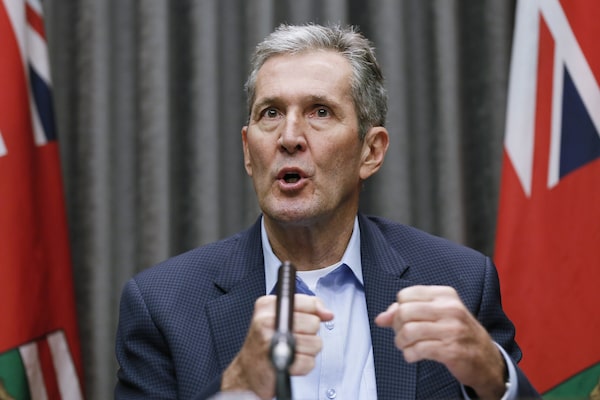
Manitoba Premier Brian Pallister, seen here on March 26, 2020, said that his province had just one to two months of cash on hand as of March 26, with long-term borrowing costs sitting 150 basis points higher than those of the federal government.JOHN WOODS/The Canadian Press
Two weeks ago, the premiers sent an urgent appeal to Prime Minister Justin Trudeau, asking for “emergency federal borrowing” on behalf of the provinces.
Provincial borrowing costs have risen relative to those of Ottawa amid the economic chaos brought on by the coronavirus. In their April 3 letter, the premiers warned that billions would be spent on interest payments rather than services as a result. To avoid that scenario, they asked that Ottawa borrow, at the lower rates available to the national government, and then pass those funds to the provinces.
In an earlier letter to the Prime Minister, Manitoba Premier Brian Pallister painted an even starker picture, saying that his province had just one to two months of cash on hand as of March 26, with long-term borrowing costs sitting 150 basis points higher than those of the federal government. Newfoundland and Labrador Premier Dwight Ball issued a similar warning to Ottawa a few days earlier.
Almost as an afterthought, the premiers requested in their April 3 letter that the Bank of Canada start buying provincial bonds, a move designed to push down borrowing costs.
On Wednesday, the premiers got an answer – they received the afterthought. The Bank of Canada announced that it will buy up to $50-billion of provincial bonds with remaining terms of maturity of 10 years or less, an expansion of its move into quantitative easing. (In March, the bank took a number of steps to intervene in credit markets, including the purchase of up to 40 per cent of new provincial debt with terms of a year or less.)
The premiers may not have gotten the direct subsidy from Ottawa they were hoping for. But they have gotten some support from the central bank that will buoy up demand, and the prices of their bonds – in effect, a subsidy from the apparatus of the federal government, if not the federal treasury directly.
As reported by The Globe earlier this week, that $50-billion represents a sizable proportion of the incremental $130-billion that the provinces are likely to borrow over the next year. Although the purchases aren’t slated to start until next month, the mere intention is already having an effect. In a research note issued Wednesday, the Bank of Nova Scotia pointed out that the spread between the 10-year Canadian and provincial bonds had already narrowed.
Brandon Schaufele, assistant professor of business, economics and public policy at the Ivey Business School at the University of Western Ontario, said he views the move as distorting the message that markets are sending about the provinces’ fiscal policies.
There is a general flight to safety, he acknowledges, that has increased the relative cost of provincial borrowing. But the increased spread between Ottawa’s and the provinces’ borrowing costs is “absolutely” a message that there is market worry about the possibility of a provincial default, he said.
The rising spreads are like a price signal in any other market, Mr. Schaufele said – they provide information, in this case, a collective view on the provinces’ tax and spending policies. The bank’s intervention obscures that view, he said. "They’re actually muddying that signal a little bit.”
Phillip Cross, former chief economic analyst at Statistics Canada and a fellow at the Macdonald-Laurier Institute, said that until recent weeks, bond markets have assumed that no Canadian province would be forced to default. Ultimately, the federal government would intervene.
That certainty has begun to waver, he said, as the federal government’s spending ramps up, and as municipal governments, universities and transit authorities, to name a few, clamour for additional assistance. “This country is going to be awash in debt,” he said, adding that even Ottawa’s considerable fiscal resources aren’t boundless. “They can’t bail out everyone.”
Mr. Cross also warned that it would be a problem for the federal government to accede to the premiers’ request to start borrowing funds on their behalf, even though the request came with a promise to repay any loans. He said the federal government would certainly place conditions on such aid. “You wouldn’t give a blank cheque to your kids.”
Tax and Spend is a new series that examines the intricacies and oddities of taxation and government spending.
Your time is valuable. Have the Top Business Headlines newsletter conveniently delivered to your inbox in the morning or evening. Sign up today.
 Patrick Brethour
Patrick Brethour